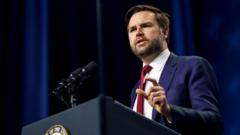Meloni's visit underscores her unique position in bridging relations between the EU and the U.S. in challenging economic times.
Meloni's Balancing Act in Washington: EU Interests vs. Trump Ties

Meloni's Balancing Act in Washington: EU Interests vs. Trump Ties
Italian Prime Minister seeks favorable terms for EU amidst U.S. tariffs
Giorgia Meloni, Italy's Prime Minister, has embarked on a critical visit to the United States, where she is set to engage in discussions with former President Donald Trump. This meeting is particularly significant as she becomes the first European leader to reach Washington since Trump paused a controversial 20% tariff on the EU in April. Meloni's objective centers on persuading Trump to consider a "zero-for-zero" tariff agreement across the entire EU, a proposal crucial for Italy, which exports approximately 10% of its goods to the U.S., an economic lifeline currently at risk.
Prior to her departure, Meloni expressed her awareness of the challenges she faces, insisting that she will advocate for European interests while navigating the complexities of working with Trump. Her relationship with Trump, defined by mutual respect and shared views on issues such as immigration and economic nationalism, places her in a unique position among European leaders. Notably, she was the only European leader present at Trump's inauguration, fostering a rapport that could either benefit or complicate her mission.
Political analysts suggest that Meloni understands the need for Europe to work in concert rather than act unilaterally, despite her alignment with Trump's agenda. Italy's Foreign Minister, Antonio Tajani, reinforced this notion, stating that Meloni's discussions would align with her responsibility to advocate for collective European negotiations. However, there are underlying concerns among other EU nations regarding her representation, with some fearing that Meloni may prioritize Italy's needs over the broader European stance during her talks.
As Meloni prepares for her meeting, she aims to communicate to Trump that European nations are intent on enhancing trade relations and collaborating on defense, particularly by increasing purchases of American goods, including liquefied natural gas. Additionally, she may signal to the U.S. that Europe is not inclined to hastily engage with China, a message that could potentially solidify transatlantic ties.
Her ongoing efforts are not without scrutiny. Political opponents at home have raised alarms about her closeness to the Trump administration, claiming that her return may reflect more of an American influence rather than an Italian or European one. The stakes are high, as Meloni positions herself at the nexus of two powerful economies, balancing her commitment to EU solidarity with her rapport with the former U.S. President. As her departure approaches, she remains aware of the historical significance and potential pitfalls of her Washington mission, humorously asserting that she feels "no pressure at all."
Prior to her departure, Meloni expressed her awareness of the challenges she faces, insisting that she will advocate for European interests while navigating the complexities of working with Trump. Her relationship with Trump, defined by mutual respect and shared views on issues such as immigration and economic nationalism, places her in a unique position among European leaders. Notably, she was the only European leader present at Trump's inauguration, fostering a rapport that could either benefit or complicate her mission.
Political analysts suggest that Meloni understands the need for Europe to work in concert rather than act unilaterally, despite her alignment with Trump's agenda. Italy's Foreign Minister, Antonio Tajani, reinforced this notion, stating that Meloni's discussions would align with her responsibility to advocate for collective European negotiations. However, there are underlying concerns among other EU nations regarding her representation, with some fearing that Meloni may prioritize Italy's needs over the broader European stance during her talks.
As Meloni prepares for her meeting, she aims to communicate to Trump that European nations are intent on enhancing trade relations and collaborating on defense, particularly by increasing purchases of American goods, including liquefied natural gas. Additionally, she may signal to the U.S. that Europe is not inclined to hastily engage with China, a message that could potentially solidify transatlantic ties.
Her ongoing efforts are not without scrutiny. Political opponents at home have raised alarms about her closeness to the Trump administration, claiming that her return may reflect more of an American influence rather than an Italian or European one. The stakes are high, as Meloni positions herself at the nexus of two powerful economies, balancing her commitment to EU solidarity with her rapport with the former U.S. President. As her departure approaches, she remains aware of the historical significance and potential pitfalls of her Washington mission, humorously asserting that she feels "no pressure at all."




















